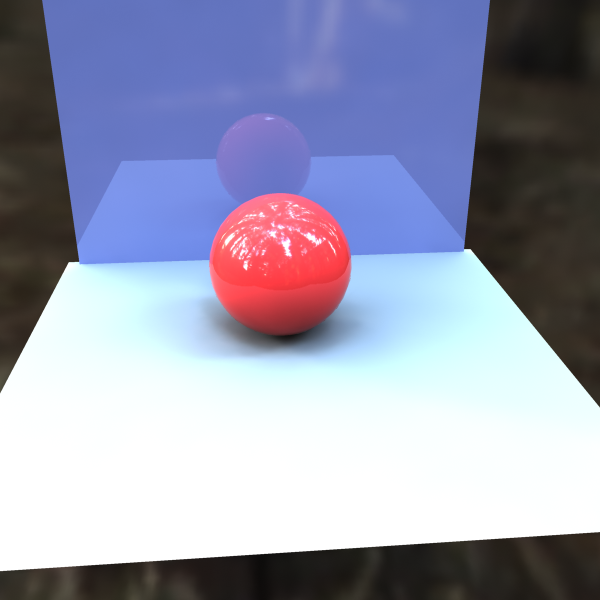This page provides information on the Color Mapping rollout of the Render Settings.
Overview
Color mapping (also called tone mapping) can be used to apply color transformations on the final image colors. Sometimes an image can contain a higher range of colors that can be displayed on a computer screen. Color mapping has the task of re-mapping the image values to be suitable for display purposes.
UI Path: ||Render Settings window|| > VRay tab > Color mapping rollout
Color Mapping Parameters
Type – The type of transformation used. These are the possible types:
Reinhard – Blends between exponential-style color mapping and linear mapping. Use the Burn Value parameter to set the blend value.
Linear multiply – A simple multiplication of the final image colors based on their brightness without applying any changes.
Exponential – Saturates colors based on their brightnesses. This can be useful to prevent burn-outs in very bright areas (for example around light sources). This mode clamps colors so no value exceeds 255 (or 1 in floating point value).
HSV exponential – Similar to Exponential mode, but preserves hue and saturation instead of washing out the color towards white.
Intensity exponential – Similar to Exponential mode, but preserves the ratio of the RGB color components; only the intensity of the colors are affected.
Gamma correction – Applies a gamma curve to the colors. In this case, the Dark multiplier is a general multiplier for the colors before they are gamma-corrected, and the Bright multiplier is the inverse of the gamma value (eg. for gamma 2.2 , the Bright multiplier must be 0.4545 ).
Intensity gamma – Applies a gamma curve to the intensity of the colors, instead of each channel (r/g/b) independently.
For more information, see the Color Mapping Modes example and the Color Mapping Types with VRaySun and Sky examples below.
Multiplier – The overall multiplier when the color mapping Type is set to Reinhard.
Burn Value – Adjusts the blend of mapping between linear and exponential style for the Reinhard transformation type. If Burn Value is 1.0, the result is linear color mapping; if Burn Value is 0.0, the result is exponential-style mapping.
Dark multiplier – The multiplier for dark colors. Applies to all Types other than Reinhard.
Bright multiplier – The multiplier for bright colors. Applies to all Types other than Reinhard.
Gamma – Controls the gamma correction for the output image regardless of the color mapping mode. Note that the value here is the inverse of the one used for the Gamma correction color mapping type. For example, to correct the image for a 2.2-gamma display, you can simply set the Gammaparameter to 2.2 .
Affect background – If enabled, color mapping will not affect colors belonging to the background.
Mode – Determines whether color mapping and/or gamma correction are burned into the final image. This option replaces the Don't affect colors (adaptation only) option from previous V-Ray versions. The possible values are:
Color mapping only, no gamma – Color mapping is burned into the final image, but not the gamma correction. This is the default option. V-Ray will still proceed to sample the image as though both color mapping and gamma are applied, but will only apply the color correction ( Linear , Reinhard, etc.) to the final result.
Color mapping and gamma – Both color mapping and gamma correction are burned into the final image. This corresponds to having the Don't affect colors, adaptation only option disabled in previous V-Ray versions.
Don't affect colors, only adaptation – Neither color mapping nor gamma are burned into the final image. However, V-Ray will proceed with all its calculations as though color mapping and gamma are applied (e.g. the noise levels will be corrected accordingly). This can be useful, for example, if you know that you will apply some color correction to the image later on, but wish to keep the rendering itself in linear space for compositing purposes. This corresponds to having the Don't affect colors, adaptation only option enabled in previous V-Ray versions.
Rendering color space – Color space to use for rendering,. Affects Sun/Sky, temperature color controls, and texture color conversion. For VFB to properly display ACEScg renders, use the respective OCIO config. The following options are available:
From Maya Preferences
Scene-linear Rec 709/sRGB
ACEScg – For more information on ACEScg workflow with V-Ray, see the ACEScg Workflow Setup page.
Color Mapping Advanced Parameters
Subpixel mapping – Controls whether color mapping will be applied to the final image pixels, or to the individual sub-pixel samples.
The subpixel color mapping option is incompatible with the adaptive lights and can lead to blocky artifacts due to the different sampling rate of the light sources in different cells of the light grid.
Affect swatches – Controls whether or not the color corrections will be applied to the material swatches in the Hypershade and the Attribute Editor.
Example: Color Mapping Modes
This example demonstrates the differences between the color mapping modes:
Note: The Sibenik Cathedral model was created by Marko Dabrovic.
Linear color mapping
Linear color mapping
Exponential color mapping
Exponential color mapping
HSV exponential color mapping
HSV exponential color mapping
As seen in the images above, the Linear mapping method clamps bright colors to white, causing bright parts of the image to appear "burnt out". Both the Exponential and HSV exponential modes avoid this problem. While Exponential mode tends to wash out the colors and desaturate them, HSV exponential mode preserves the color's hue and saturation.
Example: Color Mapping Types with VRaySun and Sky
Enabled: On, Height Y: 290, Turbidity: 3.0, Shadow subdivision: 8, Intensity multiplier: 1, Size multiplier: 1.0
Color mapping: Linear
Color mapping: Exponential
Color mapping: HSV exponential
Color mapping: Intensity exponential

















